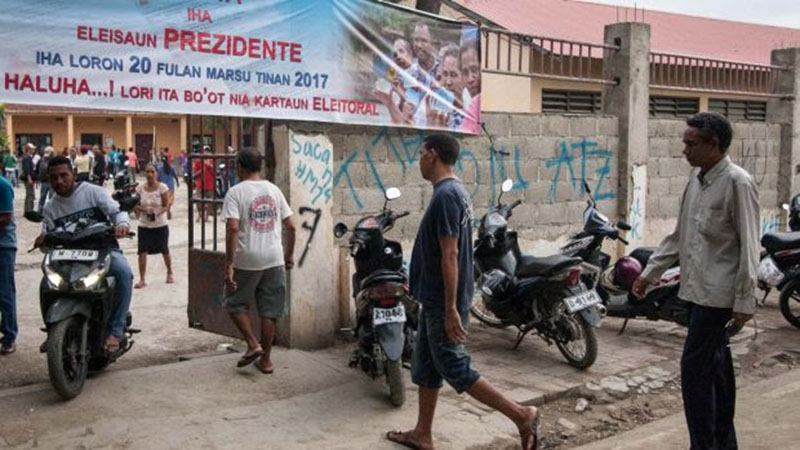MEDIAONETIMOR-East Timorese leader Jose Ramos Horta has lashed out at what he calls “outrageous” claims before an Australian parliamentary committee that his country could be heading towards becoming a failed state.
“What fly-in, fly-out so-called instant experts on East Timor claim is outrageous … it’s just nonsense,” Dr Ramos Horta, a Nobel laureate and East Timor’s former president and prime minister, told Fairfax Media.
East Timor’s historic election
It is the first presidential election since the departure of United Nations peacekeepers in 2012.
“It’s either ignorance or malice,” he said, adding: “I’m sorry. I don’t pay much attention to these so-called academics.”
Rebecca Strating, a lecturer at Victoria’s La Trobe University, told parliament’s treaties committee on 14 March it could “very well be” that East Timor is the “architect of its own demise” and there are indications that like a number of fragile resource-wealthy post-conflict states, the country is “resource cursed”.
Related Content
-
Former anti-Indonesian guerrilla fighter leads vote count in East Timor election
-
Long queues as East Timorese choose to have a say in future of Asia’s newest democracy
She said a window on developing the $US40 billion Greater Sunrise oil and gas field in the Timor Sea has “partially” closed because of lower gas prices and a long-running dispute with Australia over how to develop it.
“There are elections this year … a change of government or a change in personalities might produce a government that is willing to think a little more laterally or flexibly around the interests in the Timor Sea,” Dr Strating said.
“But since 2012 it seems to me that this pursuit of independence may actually create a failed state in Timor-Leste [East Timor],” she said.
In response, Hansard records the chair of the committee telling Dr Strating “tremendous … most enlightening. ‘The architect of their own demise’ is my favourite statement of the day.”
Speaking after East Timorese voted at presidential elections on Monday, Dr Ramos Horta said his country’s sovereign wealth fund has $US16 billion to $US17 billion invested around the world and is spending some of it to develop badly needed infrastructure.
He said the government in Dili is talking with a consortium led by ConocoPhillips to resurrect shelved plans to develop Greater Sunrise before negotiations with Australia on sea borders are completed by a September deadline.
“I would say there is a very good chance that Greater Sunrise will be developed,” he said. “How, I don’t know. I am not involved.”
East Timor’s independence hero and political powerbroker Xanana Gusmao has demanded gas from the field be piped to a proposed $US1.4 billion industrial complex on the country’s remote southern coast.
The ConocoPhillips consortium wants the gas to be extracted through a floating platform or to an existing refinery in Darwin.
Francisco “Lu-Olo” Guterres, who is set to become East Timor’s next president, has also told Fairfax Media there are now “better prospects” for developing Greater Sunrise, which would deliver billions of dollars in revenue to his country.
But Clive Schofield, director of research at the Australian National Centre for Ocean Research and Security, told the parliamentary committee that at current gas prices it is “not entirely likely” that a commercial decision would be made to develop Greater Sunrise.
“We have low oil and gas prices. I suspect the asset, as it were, will be put on the shelf until such a time as gas prices in particular rise sufficiently to make it viable,” he said.
Asked about Dr Ramos Horta’s comments, Dr Strating said she wanted to clarify that she does not think East Timor is “necessarily” heading towards becoming a failed state – only that this is possible if an agreement is not reached before oil revenues from an existing oil and gas field and the sovereign wealth fund run out.
“This is why it is so vital for Australia and Timor-Leste to find a hasty compromise [on Greater Sunrise],” Dr Strating said.
“Timor-Leste only has five years until the oil revenues are gone. The revenues provide over 90 per cent of the state budget,” she said. “If Timor-Leste does not have a source of income to provide for state budgets it is very possible that it will become dependent on aid.”
Dr Strating said multiple reports had predicted the sovereign fund could be depleted within a decade.
She said her comments were not made out of malice but for concern about what happens if East Timor and Australia are unable to reach an “expedient” agreement on Greater Sunrise. (ETAN/indsay Murdoch)






Discussion about this post